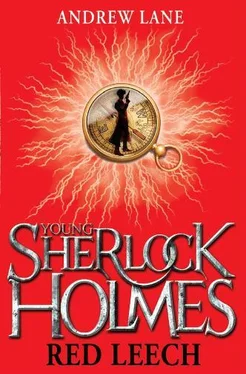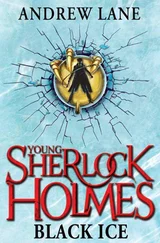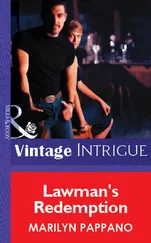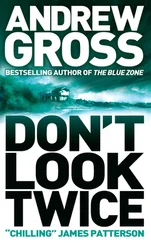Looking around to distract himself, Sherlock noticed a man nearby. He was standing by himself, holding what appeared to be a violin case, but instead of gazing at the crowd he was looking in the other direction, out to sea. He was thin, with black hair longer than was usual in a man, and his jacket and trousers appeared to be of corduroy. Sherlock guessed him to be in his thirties. He raised a hand to shield his eyes from the sun, and Sherlock noticed that his fingers were long and thin. He suddenly looked sideways at Sherlock, and he smiled, touching his forehead in a casual salute. His eyes, Sherlock noticed, were green, and the wideness of his smile revealed a gold tooth set far back in his mouth.
“The start of an adventure,” he called. His voice held a slight Irish brogue.
“Eight days at sea with nothing to do but walk around and read books,” Sherlock called, emboldened by the excitement of their departure into talking to a complete stranger. “Not much of an adventure.”
“Ah, but think of the miles and miles of water that will lie beneath us as we travel. Think of the wrecks of other ships that litter the bottom of the sea, and the strange creatures that swim there, in and out of the portholes and around the bones of drowned sailors. Adventure is all around, if you know where to look.” He raised the case that he carried. And if all else fails, I can take some time to practise my music on deck, beneath the stars, and serenade the mermaids.”
“Mermaids?” Sherlock asked sceptically. “More likely to be dolphins, or some other kind of marine life.”
“A man can dream,” the stranger said. He nodded genially at Sherlock, tipped his cap and moved away through the crowd. Sherlock kept track of his long black hair for a while, but eventually lost him in the press of people.
“If you want to wander off and explore,” Amyus Crowe said from behind him, “you go ahead. We’re gonna be on this ship for a week or more, an’ I have no intention of shepherding you all that time. As long as you don’t fall overboard, there ain’t nowhere you can go. I’m gonna go back to Ginnie’s cabin an’ introduce myself to her companion, make sure the woman’s not a drunk or a lunatic or both. We’ll meet up in our cabin, by an’ by, an’ then we’ll see what’s happening for dinner.”
Sherlock wandered up towards the front of the ship — the bows, as sailors called them. He passed the bridge on the way — the raised area where the Captain stood, immaculate in his uniform and peaked cap, along with the helmsman who steered the vessel via a huge wheel, the same size and construction as the wheel of a cart, as far as Sherlock could tell. Behind them was a small cabin, shielded from the wind and the rain, but the majority of the bridge was actually open deck. Set to one side was a strange metal object on a pole, something like an alarm clock with extra-long hands which could be moved around the face, but instead of being marked with hours and minutes the face of the device had words on — “Ahead”, “Full Steam”, “Stop” and “Slow”. It only took a few seconds before Sherlock worked out that it must be a communications device, allowing the Captain to give his orders to the engine room, far below the deck. The hands, as they were moved to cover particular words, probably rang different bells down in the engine room which the stokers would then respond to.
Further ahead, just before the bows, was a roofed-over enclosure, like a long barn. It even smelt like a barn. Sherlock took a look inside, through one of the openings that lined its walls, and was surprised to see animals inside, all penned together in a small space. It had been built up in three storeys, with cows, pigs and sheep clustered on the bottom, ducks and geese in the middle and chickens on top. Each animal was protesting against the vibration and the cold sea wind which whipped across the ship. Presumably they would provide eggs and milk, and even meat as their numbers were gradually whittled down. By the end of the voyage, the barn, like the coal-storage area, would probably be almost empty. Sherlock hadn’t expected there to be live animals on board, but he supposed it made sense. Fresh food could not be expected to keep for the period of the voyage, especially if storms or mechanical breakdown delayed them. Presumably, somewhere else on the ship, vegetables and fruit were either being stored or, perhaps, even grown, and somewhere else would be barrels filled with fresh water. And presumably several hundred bottles of wine, champagne, port, brandy and whisky for the First Class passengers.
Something flickered at the edges of his vision. He turned his head quickly. A dark figure faded back into the shadow of a lifeboat. Sherlock took a couple of steps forward, but the figure had vanished. He shook his head. It was probably just one of the passengers.
Moving further forward, Sherlock watched for a while as the coast slipped away on their right-hand side. The ship would undoubtedly hug the coast as it headed west, around Cornwall, and then strike out across to the coast of Ireland. Once past there, it would head out into open waters across the three thousand or so miles of ocean that lay between that coast and the harbour at New York for which they were bound.
He was surprised how stable the ship felt. There was barely any swaying from side to side. Perhaps things would be different out in the Atlantic, but the ship’s size and weight seemed to protect it against the relatively small waves here along the English coast. Sherlock couldn’t help remembering the small boat in which he and Matty had sailed from Baron Maupertuis’s offshore Napoleonic fort to the coast near Portsmouth. That journey had been grim, and he had no intention of experiencing anything like that again.
He suddenly felt very lonely. England, and everything that meant to him — his home, his family, even his school — was slowly falling away, and all that was ahead of him were surprises — a new world, a new set of people and customs. And danger. He didn’t know what the men who were keeping John Wilkes Booth captive wanted, but they obviously had a plan, and it was one that they were willing to kill to keep secret. And here he was, just a boy, getting involved with intrigues beyond the limits of his world.
And Matty. What about Matty? Sherlock doubted that he was as comfortable as the three of them looked likely to be, here on the SS Scotia. Matty was probably tied up, or at least confined to a cabin somewhere. Maybe his captors had come to a deal with him — since they were all aboard a ship and he couldn’t escape, if he promised not to cause trouble they would let him roam free — but Matty could be stubborn, and he might have refused.
That was assuming he was still alive. Amyus Crowe and Mycroft had both deduced that he was, but Sherlock was acutely aware that deductions were just projections into a sea of fantasy based on a few known facts. If the facts were wrong, or if the projection wasn’t done in the right direction, then the final destination would be wildly inaccurate. And Matty might be dead. The Americans might have decided not to have the burden of a live captive throughout the journey, and just slit Matty’s throat and dumped him by the side of the road back in England. The message might just have been a hoax, a wild attempt to stop Amyus Crowe from interfering, but with nothing to back it up.
Morosely Sherlock wandered back along the rails that lined the deck. He had to ask directions of a steward at one point: a thin man with an immaculate uniform and a blond crew cut beneath his cap. Having found out where he was going, he walked past groups of excited travellers, past the two funnels and the two huge, trunk-like masts, past the long, low shape of the communal First Class saloon, with its windows looking out on to the deck, and back to the bows of the boat. The white wake of their passage trailed behind them like the tail of a comet. Sea birds followed them, diving into the wake for disturbed and disoriented fish.
Читать дальше












